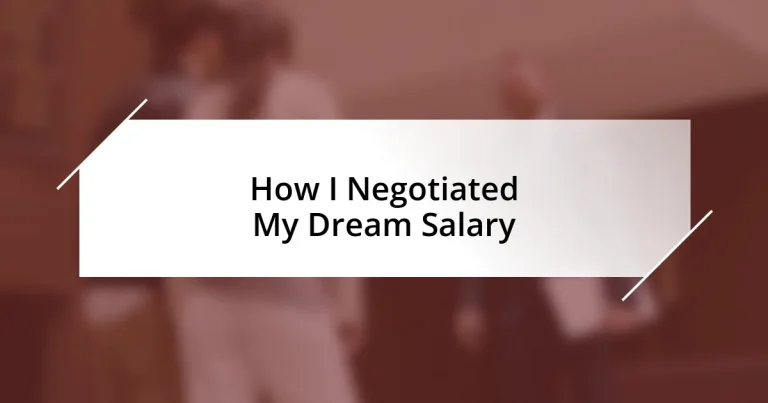Key takeaways:
- Utilize salary research methods, including online resources and networking, to understand market benchmarks and confidently assess your worth.
- Prepare a comprehensive salary proposal that clearly outlines your accomplishments, skills, and the value you bring, supported by comparable data.
- Practice effective negotiation techniques, such as active listening and non-verbal communication, to foster a collaborative dialogue.
- Respond strategically to counteroffers, maintaining a cooperative tone and demonstrating patience to achieve the desired outcome.

Understand Salary Research Methods
When I first started to think about negotiating my salary, I quickly realized that understanding salary research methods was crucial. I dove into online resources like Glassdoor and Payscale, which provided a wealth of information about what others in my field were earning. It felt empowering to see the numbers laid out, especially when I could compare my experience level and location to that of my peers.
Another method I found invaluable was talking to industry contacts. Networking can feel daunting, but I discovered that many people were willing to share their experiences and insights, often revealing salary ranges that I had never considered. Have you ever felt hesitant to ask others about their pay? Trust me, a simple conversation can open up new perspectives and help you feel more confident in your own worth.
I also looked at job postings which often included salary ranges. I remember one job listing that seemed perfect, but the salary was far below what I hoped for. This sparked a realization: knowing salary benchmarks helped me frame my expectations and recognize my true value in the job market. It was crucial for me to approach negotiations not just with emotion, but backed by solid research.

Identify Your Worth and Value
Identifying your worth and value in the job market can be a game changer. I remember sitting at my desk, reflecting on my skills and experiences. It struck me that I had a unique blend of expertise that set me apart. What factors contribute to your value? Consider not just your years of experience but also the specialty skills you bring. I realized that embracing my unique qualifications gave me more confidence during negotiations.
One effective approach I used was creating a personal inventory of my accomplishments, similar to a portfolio. This meticulous documentation included everything from projects I led to times I solved problems creatively. When I finally faced my potential employer, I felt armed with evidence of my worth. It was like having a shield against any doubts that might creep in during discussions. How often do you reflect on the impact you’ve had in your roles? Maintaining this self-awareness is crucial to advocating for yourself.
Additionally, feedback can reinforce your understanding of your value. I often reached out to colleagues and mentors for their perceptions of my strengths. Their encouragement and insights validated my self-assessment and helped me articulate my worth more effectively. Have you ever received recognition for your contributions? Those moments are golden; they serve as a reminder of the value you bring to a team or project.
| Factors in Identifying Worth | Personal Reflections |
|---|---|
| Years of Experience | Shaped my understanding of industry standards |
| Specialty Skills | Made me feel unique and valuable |
| Accomplishments | Provided tangible evidence during negotiations |
| Feedback | Reinforced my confidence and self-assessment |
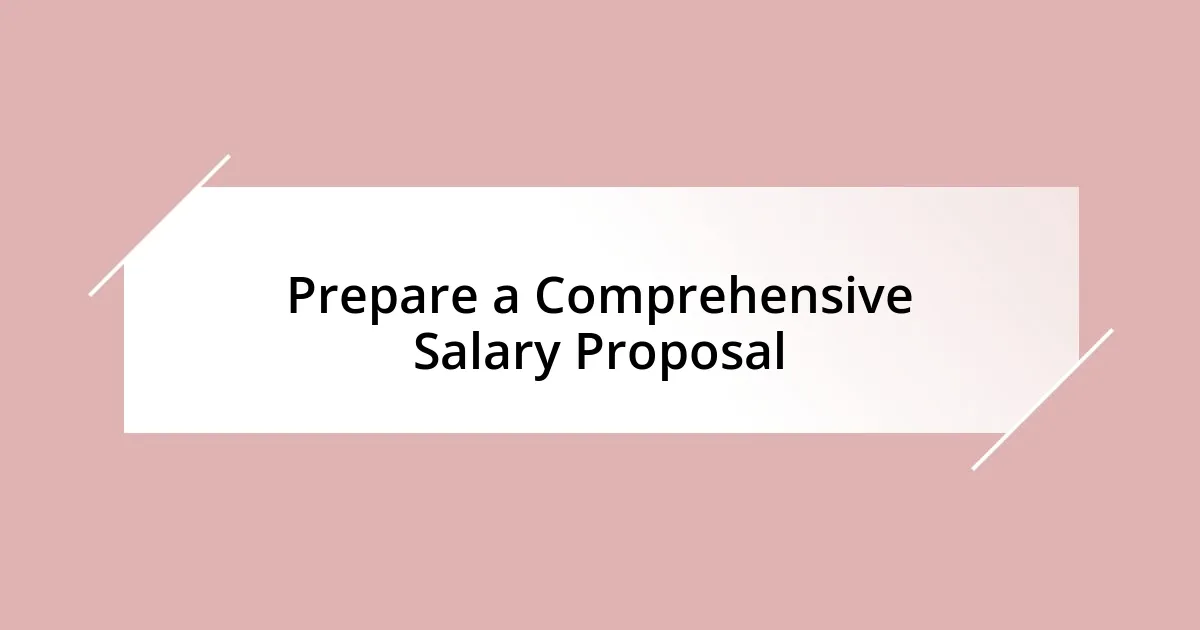
Prepare a Comprehensive Salary Proposal
Preparing a comprehensive salary proposal is essential for successful negotiations. I remember spending hours crafting my proposal, ensuring it was not only thorough but also personal. By aligning my skills and experiences with industry benchmarks, I created a narrative that showed why I deserved the proposed salary. I aimed for clarity while highlighting my unique contributions, and it definitely paid off.
To create your own compelling salary proposal, consider including the following elements:
– Detailed Salary Breakdown: Present the total figure along with base salary and benefits.
– Comparable Data: Include salary ranges from reputable sources to justify your request.
– Personal Achievements: Highlight specific projects and impacts that relate to your desired salary.
– Unique Skills: Specify any niche skills that differentiate you from others.
– Future Contributions: Articulate how you plan to add value moving forward, demonstrating an understanding of the company’s goals.
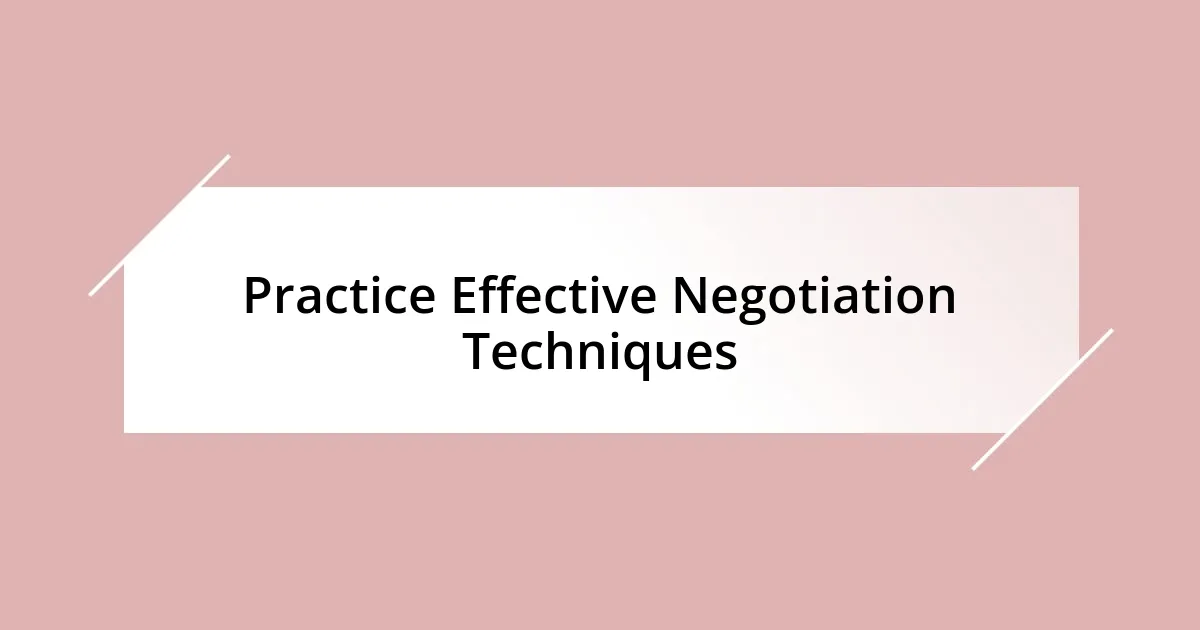
Practice Effective Negotiation Techniques
Effective negotiation techniques are essential when discussing salary. I remember practicing my pitch with a friend who had experience in hiring. As I rehearsed, I found where I felt unprepared or uncertain in my delivery. This practice not only boosted my confidence but also allowed me to refine my message, ensuring I presented my value clearly and assertively. Have you ever practiced in front of someone? It can reveal blind spots and help you anticipate different scenarios that might arise during actual negotiations.
Another technique that proved invaluable was active listening. During discussions, I made a point to truly listen to the employer’s concerns and responses. I would often nod in agreement and repeat back what I understood, which not only showed I was engaged but also allowed me to find common ground. Did you know that acknowledging the other party’s perspective can foster a more cooperative atmosphere? It transformed the negotiation into a dialogue rather than a duel.
Lastly, I learned that non-verbal communication plays a huge role in negotiations. I focused on maintaining eye contact and adopting open body language, which conveyed confidence and approachability. For instance, I stood tall and used gestures to emphasize key points. Reflecting on my experiences, I realized that my body language conveyed just as much as my words. Have you paid attention to how you present yourself during critical conversations? Sometimes, what we don’t say speaks louder than the actual words exchanged.

Leverage Timing for Better Offers
Timing can be a game changer during salary negotiations. I remember when I was interviewing for a position that had a flexible start date. During our discussions, I strategically mentioned that I could begin immediately, tapping into the urgency they felt to fill the role. This simple choice of timing played a crucial role in securing a higher offer, as they were motivated to bring someone on board quickly.
Another factor to consider is the company’s fiscal calendar. I found that negotiating right before the end of the quarter, when budgets were being finalized, often led to better offers. Employers tend to feel pressure to use allocated funds before they disappear. I made my pitch during these critical times, which not only showcased my awareness of their needs but also positioned my request favorably within their financial timeline.
Lastly, I learned to leverage my own readiness and market positioning. For example, when I received other offers, I didn’t hesitate to mention them during negotiations. This created a sense of urgency for the employer to act quickly and decisively. Have you ever felt the momentum of urgency during a negotiation? That sense can not only influence your offer but also reflect how much they value your candidacy.
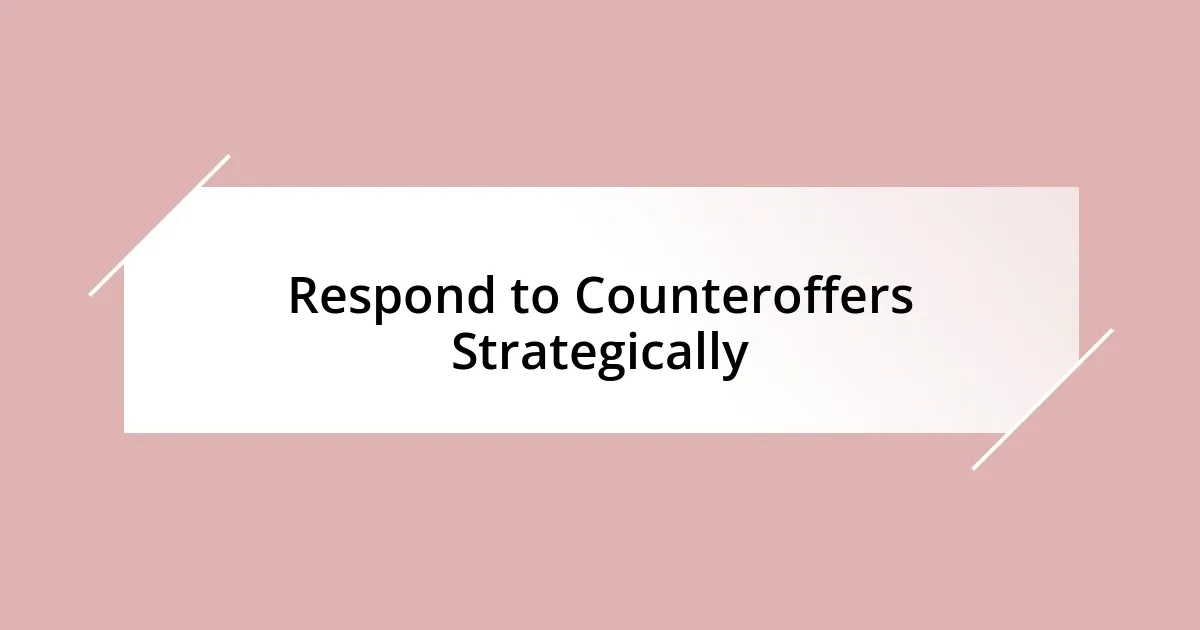
Respond to Counteroffers Strategically
When a counteroffer comes your way, your response should be thoughtful and strategic. I recall the time I received a counteroffer that was lower than what I realistically expected. Instead of dismissing it, I took a moment to evaluate their offer against my initial request and the value I brought to the table. This pause allowed me to craft a counter-discussion that considered their constraints while sticking to my worth. Have you ever felt tempted to react immediately? Taking a step back can help you respond more effectively.
I remember discussing my counteroffer politely but firmly, emphasizing my unique skills and the market value for similar roles. By framing it this way, I not only justified my request but also reinforced my commitment to the role. It’s important to position your response as a collaborative effort to find common ground—this often softens the conversation. Have you noticed how a cooperative tone can shift the atmosphere during negotiations? It invites a more constructive dialogue.
One lesson that really stood out for me was the power of patience. Sometimes, I felt the urge to settle at any sign of enthusiasm from the employer. However, I decided to give it some time, understanding that good things often take a moment to materialize. I was rewarded when I eventually received a better offer after letting the discussions evolve. Have you ever found that waiting can lead to unexpected rewards? The key is to remain calm and allow the situation to unfold.
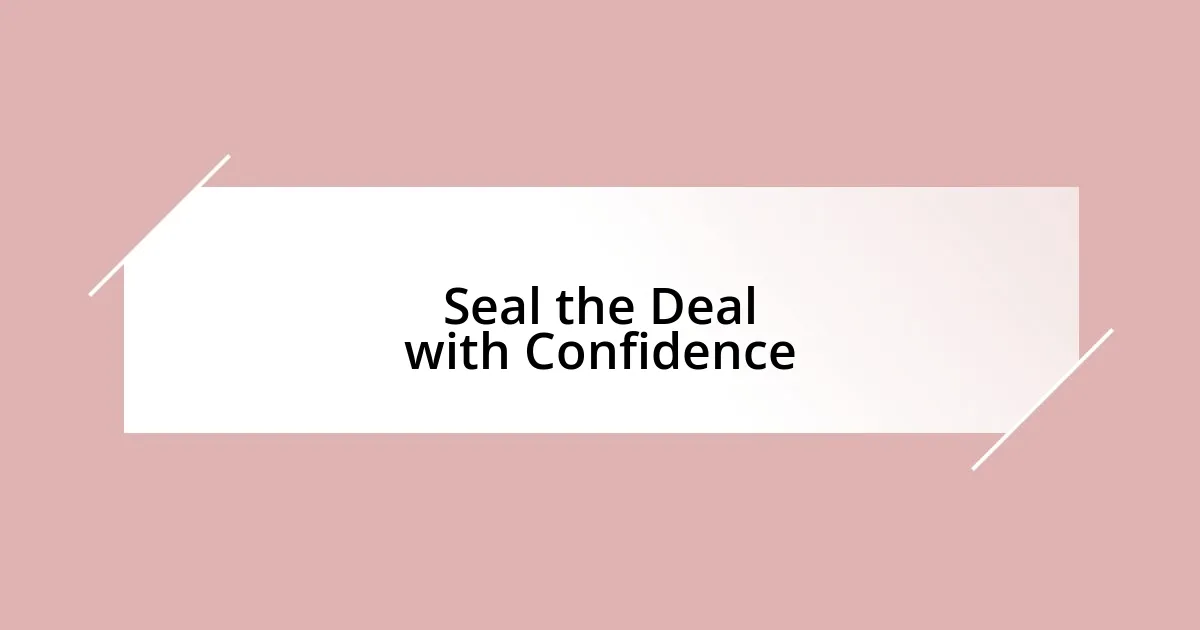
Seal the Deal with Confidence
As I approached the final stages of my negotiation, I felt a blend of excitement and nerves. There was a moment when I paused, looked the hiring manager in the eye, and confidently stated my desired salary. I had rehearsed this part in my mind, visualizing the exact words, and it made a significant difference. Have you ever felt that surge of adrenaline when you finally say what you truly want? That moment can be pivotal, transforming nerves into empowerment.
I remember a specific negotiation where I leaned into my passion for the role during our conversation. I conveyed that not only was I excited about joining the team, but I also believed my background uniquely positioned me to make a significant impact. My voice cracked slightly as I shared my enthusiasm, but I could see the spark in the employer’s eyes. It was a reminder that confidence stems from genuine belief in your value. Has there been a time when expressing your real enthusiasm shifted the dynamics of a conversation for you?
Finally, I found that closing the deal confidently involved expressing gratitude. When I received the offer, I made it a point to thank them profusely and express how thrilled I was about the opportunity. This final touch was not only about sealing the deal but also about laying the groundwork for a positive working relationship. Isn’t it fascinating how a simple act of gratitude can solidify your negotiation success? It reinforces a sense of collaboration rather than confrontation, making the whole process feel more rewarding.












